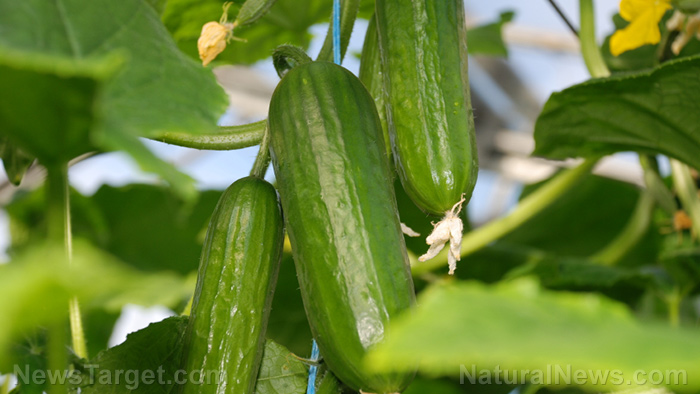A cucumber a day keeps the heart doctor away
09/13/2018 / By Edsel Cook

The old folk wisdom “an apple day keeps the doctor away” just got an upgrade, thanks to the work of Italian researchers. Only now, it’s cucumbers instead of apples, and heart doctors instead of regular ones. In their study, published in BMC Complementary and Alternative Medicine, they showed that the cucumber (Cucumis sativus) can protect the endothelial cells that line the inner part of the vascular system. A water/ethanol extract made from the common gourd is shown to prevent inflammation caused by lipopolysaccharides.
The vascular system transports almost everything throughout the body. If its integrity is broken, it causes serious health problems such as heart diseases. Endothelial cells are important to vascular integrity. They are vulnerable to lipopolysaccharide, which triggers inflammation in the endothelium layer. Inflammation results in heart problems such as coagulation, thrombosis, and vasoconstriction.
There are protective molecules that can attenuate the negative effects of pro-inflammatories. Researchers are constantly looking for sources of these bioactive compounds in the medicinal plants found in folk medicine.
In the Ayurveda system of traditional Indian medicine, the cucumber is used to treat skin irritation and inflammation. The gourd originated in India, but it has been cultivated all around the world.
An earlier study reported that an extract made from cucumber is a strong antioxidant, while others have concluded that its aqueous extracts can reduce the inflammatory effects of ulcerative colitis. However, there has been no study that covered the anti-inflammatory properties of the vegetable. (Related: Two plants endemic to Iran and East India found to be effective against inflammation, hyperthyroidism.)

Testing the protective benefits of cucumber extracts
Researchers from the University of Bologna tested a water/ethanol extract made from cucumber on an in vitro model of endothelial cells. They used aortic endothelial cells harvested from slaughtered pigs as the basis for their experimental cell cultures.
First, they tested the cytotoxicity of the cucumber extract at doses of 0.02, 0.2, and 2 milligrams per milliliters (mg/mL). They proceeded to conduct a number of in vitro tests that exposed treated and untreated pig aortic endothelial cells to 10 micrograms of inflammatory lipopolysaccharide.
In each group, the researchers measured gene expression of endothelial cell markers, the types and amount of cytokines and chemokines that were released during the test, and the occurrence of in vitro angiogenesis. The last is the formation of new blood vessels from existing ones; it is considered to be a negative effect if it is triggered by lipopolysaccharides because the growth of the new vessels is uncontrolled.
Cucumber can protect endothelial cells from toxic lipopolysaccharides
The researchers reported that the cucumber extract mitigated inflammation in pig endothelial cell cultures. Depending on the dose, it was able to prevent the toxic effects of lipopolysaccharides, an endotoxin that is produced by many harmful bacteria. The larger the dose, the better the effectiveness of the treatment.
The extract improved the expression of ZO-1, a tight junction molecule that kept the endothelial cells bound to the endothelium. Untreated cultures displayed larger numbers of detached and round cells.
Furthermore, the extract inhibited the expression of TLR4, a gene that controls the sensitivity of endothelial cells to lipopolysaccharides. Lower levels of TLR4 activity reduces the chances of inflammation taking place in the endothelium.
The cucumber extract also prevented the secretion of inflammatory substances that appear either early (seven hours) or late (24 hours) after the treatment. At the same time, it improved the levels of anti-inflammatory cytokines that prevent inflammation. It also raised the secretion of cytokines that prevented inflammatory angiogenesis.
Last but not least, the extract induced the expression of vascular protective Hemeoxygenase-1 (HO-1), an enzyme that manages the number of protective genes present. HO-1 prevents apoptosis, thrombosis, and atherogenesis.
If you want to learn more about natural remedies for inflammation and other health problems, visit NaturalMedicine.news.
Sources include:
BMCComplementAlternMed.BioMedCentral.com
Submit a correction >>
Tagged Under:
anti-inflammatory, Ayurvedic medicine, cucumber, endothelium, food as medicine, food cures, heart health, herbal medicines, inflammation, lipopolysaccharides, natural cures, natural medicine
This article may contain statements that reflect the opinion of the author





















